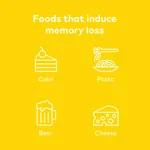Can The Foods I Eat Help My Memory?
Lifestyle
5 foods that make your memory weak
Expected read time: 4 min
Fresh finding tips delivered straight to your inbox!
Feeling like your brain is full of cotton candy? Your lunch could be responsible!
To keep your brain working and your memory sharp, you need the energy food provides, but not all foods are good for your brain in the long run too.
Processed foods high in sugar, trans fat, and artificial ingredients can impact your memory as well as your overall health and mood.


While foods like vegetables, fruits, lean proteins, healthy fats, vitamins, and minerals are good for your memory, there are also those that can impact your memory and health in general.
Foods that are quickly digested and rapidly boost and then drop your sugar and insulin levels are especially bad for your brainpower.
1. Fried foods
Most foods are fried in vegetable, sunflower, or canola oil, which are all high in omega-6 fatty acids - the harmful kind of fatty acids. While healthy omega-3 fatty acids can keep your brain fed, these are a type of fat that can impair your cognitive functions.


Indulging in fried foods every once in a while is ok and can even benefit your body since it does need omega-6 fats for energy. But making it a regular on your menu can cause inflammation, which in turn damages your blood vessels; even the ones that lead to your brain.
Foods to avoid: Chips, French fries, fried chicken, doughnuts
2. Highly processed foods
Processed foods are usually yummy since they’re packed with sugar, salt, and added fats. These additives make them taste good, but they also make them high in calories but low in nutrients.


While they don’t immediately affect your memory, in the long run, the lack of healthy nutrients will most likely affect your brain tissue and as a result, your memory.
Foods to avoid: Sweets, instant noodles, microwave popcorn, store-bought sauces, ready-made meals, processed meats and cheeses…
3. Sugary drinks
These drinks give you a quick boost when you need it the most, but the elevated blood sugar that they cause can also fuel your forgetfulness.


Numerous studies have shown that high blood sugar will increase the risk of dementia and that’s not all; sugary drinks are a triple threat since they can also cause type 2 diabetes and heart disease!
Drinks to avoid: sodas, energy drinks, sports drinks, fruit juices
4. Foods with artificial sweeteners
Do any of these sound familiar: saccharin, aspartame, sucralose, or xylitol?
These are all artificial sweeteners that you can find in everyday foods to help disguise the naturally bitter taste or boost the flavor of the foods.


Consuming these regularly will elevate your insulin levels and increase the risk of heart disease, diabetes, and metabolic syndrome, all of which are linked to memory loss and a higher risk of Alzheimer’s disease.
Foods to avoid: diet drinks, low-fat dairy products, canned foods, chewing gum, cereal
5. White carb foods
The same as excessive sugar and artificial sweeteners, white carbs can also trigger the creation of toxins in your body and memory-loss related health problems.
Your body digests these foods quickly, causing a quick spike and then drop in your sugar and insulin levels.
Foods to avoid: white bread, pasta, potatoes, cakes, white rice


While all of the above foods can be harmful to your memory, they also bring the much-needed energy your body needs to work, so don’t cut them out of your diet just yet!
Below, you’ll find a few quick tips on how to keep a healthy, balanced diet that allows you to indulge every now and then too.
Vegetables – a serving once a day, preferably leafy greens
Red meat – 4 servings a week max
Fish – at least once a week
Berries, nuts and beans – 2,3 times a week
Fried or fast food – max once a week
Cakes & sweets – max 5 servings a week
Bon Appetit!
Related blog posts
See all blogs

Can The Foods I Eat Help My Memory?
Some food for thought: what you eat may help you find your keys!


5 zodiac signs that can never remember where their keys are
A handful of zodiac signs have to work extra hard to keep all the daily details in mind and all their essentials in their pockets.
Do You Often Dream About Losing Your Wallet Or Bag?
Dreaming about losing your wallet has hidden meanings that go deeper than just your financial state. Here’s what losing your wallet or purse in your dream can...
Stay in the loop!
Join our newsletter to get 10% off Chipolo POP, plus get weekly updates on deals, tracking tips and tricks, and a dash of fun.



